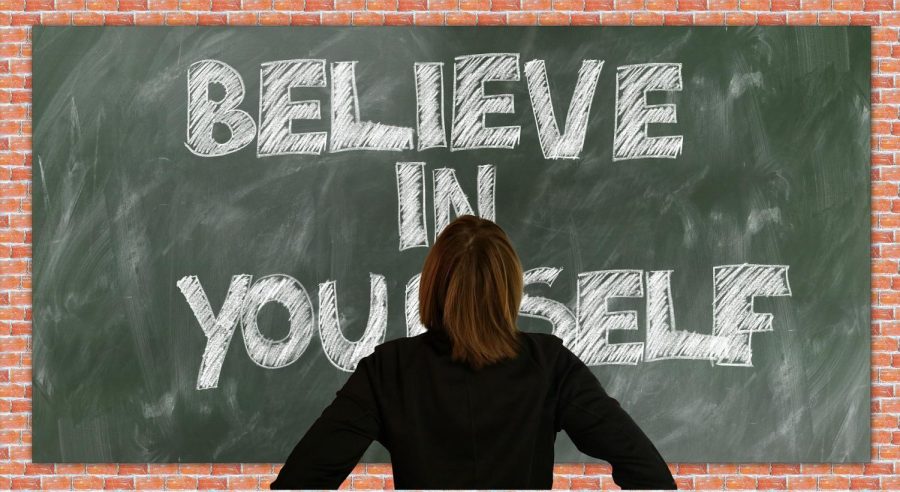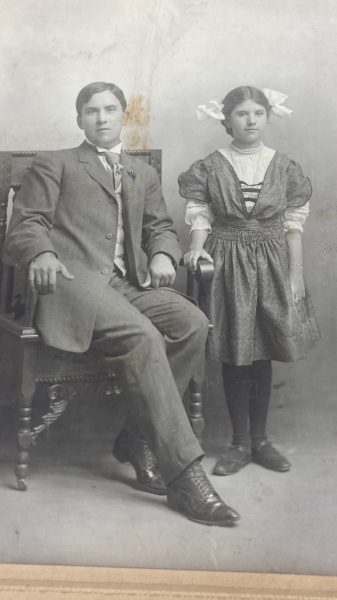How Confidence Culture Negatively Impacts Students
Not All Problems Have “Easy” Solutions
In recent years confidence has taken a new context in people’s lives. People have started to see confidence less as a state of being and more as a fix to a problem. Struggling at school? You need more confidence. Trouble making friends? Be more confident and put yourself out there. Feeling bad about yourself? Find self-confidence.
The way society (specifically American society) uses confidence is wrong. We think of confidence as a personality trait instead of a feeling. Confidence comes in waves; some days you feel confident and others you don’t. Society tends to think of confidence as something you must possess or work for to have a good life. Yes, there are more confident people than others but that’s just the same as how there are some people happier than others.
People tend to internalize that the reason they are unhappy and/or stuck in their lives is that they lack confidence. Hustle and “girlboss” culture have taught us that to succeed we have to put ourselves out there. Then and only then we can be powerful, rich, and successful. This standard is completely unattainable to many people. This standard is only pressed against us because of the “wokewashing” tactics many companies use.
Wokewashing is when an entity utilizes ethical and/or progressive values in their advertisements but then generally doesn’t implement these values in their company structure. These brands know that being more progressive is monetizable. For instance, many fashion brands preach about body confidence and loving yourself but they only carry up to a size 12.
The clothing brand Boohoo’s “mission” is to, “Empower you to look and feel confident. To increase your self-esteem and body positivity to help you realize your true potential.” Boohoo had a scandal in the past where Boohoo workers in Britain were being paid about $3.50 USD when the Britain minimum wage was $8.72 USD.
Boohoo isn’t the only brand guilty of this. Nasty Gal is known for its clothing that is meant to empower women that and is run by the founder and author of the book turned TV show #Girlboss, Sophia Amoruso. Nasty Gal is described on their website as a brand that carries, “new clothing, shoes, and accessories for gals who’ve got the confidence to just be themselves.” In 2015, Nasty Gal had a scandal where they were firing pregnant women when some company managers learned they were pregnant.
Teen brands like Hollister also use this technique. Hollister’s mission is to create “carefree styles designed to make all teens feel celebrated and comfortable in their own skin.” In a 2015 Supreme court case, Abercrombie & Fitch (Holllsiters parent company) was under fire for firing a Muslim teen after her headscarf did not comply with company policy. How can a brand preach about one thing and then do something immoral also?
Brands will oftentimes use confidence as a way to deter the public eye away from the bad things that they are doing. If they use the guise of empowering people to feel the best they can in their bodies, they can attract a loyal customer base because these customers think they are buying from a morally correct brand that aligns with their values.
Another technique brands use is when making diversity campaigns to try to show people how all bodies are beautiful. In 2004, Dove started the Real Beauty campaign in which it showed a picture with multiple models of different body types, ethnicities, ages, etc. under which were taglines like “We see beauty all around us” or “Real Women. Real beauty”. Though I applaud Dove’s attempts at diversity, most of the women in these campaigns were young, white, able-bodied, and skinny. Also by stating that all bodies are beautiful, it completely wipes out any equality issues we have in our country because we are saying that everyone is equal when most people are not.
According to the Mental Health Foundation, the poorest fifth of the UK population are twice as likely to develop mental health problems than those with average incomes. Researchers at UCLA found that people 18-28 who face discrimination are 25% more likely to be diagnosed with mental issues, undergo physiological stress, and excessively use drugs.
People have low confidence because of the situations they are in. Telling people to just be more confident doesn’t make them more confident, it just makes them more insecure because they are being told that the reason why they are insecure is because of their way of thinking, not the systems that are repressing them.
Repressed people also are not able to get help for these mental issues because many community-based clinics are severely underfunded. According to Urban Trauma: A Legacy of Racism by Mayasa Akbar, “Black communities shy away from seeking treatment for mental and physical illness for fear of experiencing more racism.” According to a study done by scientists Angela S Alberga, Sarah Nutter, and Shelly Russell-Mayhew, 24% of physicians in Canada were uncomfortable with having overweight friends and 18% said they felt disgusted when they treated a patient with a high BMI.
A fix that many people give for confidence issues is self-care. Self-care is important but it is largely tied to money. People in society tend to talk about fancy workout classes, manifesting in leather-bound journals, and soaking in a bath full of bubbles and bath salts. The people who have some of the worst confidence and mental health issues are the poor. They cannot justify spending a lot of money on soothing products when they are just struggling to survive. The message that is sent to poor people from the self-care industry is that they will never be confident, beautiful, or have a good quality of life if they can’t afford these products.
A lot of self-care is also just a scam because it’s not going to help a mentally ill person. A bath bomb is not going to unpack your trauma but a therapist can. Recommending someone to “take care of you” through “me time” is not going to completely fix someone’s mental health issues.
Some people try to counteract the claim that self-care does help minorities through the widely misused quote by political activist A.udre Lorde, “Caring for myself is not self-indulgence. It is self-preservation, and that is an act of political warfare.” As Kathleen Newman-Bremang for Refinery 29 wrote most eloquently, “Self-care cannot be an ‘act of political warfare’ if the only battle you’re waging is against your frown lines with $110 moisturizer.”
A popular aesthetic that has risen in popularity with teens/young adults recently is the “that girl”. The “that girl” is known to follow the recent clean beauty trends and be insanely productive. A “that girl” would wake up at five am, go to pilates, drink her green juice, and go to the farmers market wearing a slick back bun and neutral-toned athleisure. This aesthetic isn’t open to many teens because teens don’t have the time or money to do these things. Teens don’t have a lot of money because they are at school all day and then most likely have extracurriculars after school. This leaves students with little time except maybe a few nights after school and the weekends to make money.
Not to mention, that the “that girl” often pushes ideas that center around work culture like being intensely productive, and workplaces are often known for pushing confidence onto their employees.
For instance, some people say that there is a wage gap because women aren’t confident enough to negotiate their pay, be commanding, and not apologize. Not only is this an intensely sexist overgeneralization but why do we acknowledge the issue as being that women aren’t confident enough to negotiate their pay when the issue is that women should be paid the same as a man if they are doing the same job?
If anyone, in general, is not getting paid what they should for the job they are doing, it shouldn’t be the employee’s fault. Saying an employee doesn’t have the confidence to negotiate their salary and that’s why they are being underpaid is an excuse from the employer. Not to mention, that an employee can be afraid of backlash or termination if they try to negotiate their pay. Employers should naturally be paying people for the work that they are doing.
Raslind Gill for The Conversation said, “Take the pandemic’s devastating and disproportionate economic impact on women —including increased unemployment, the scaling back of paid work, and the widening gender pay gap. In response, workplace schemes have offered “confidence training” courses and advice for women, while organizations, life coaches, and lifestyle media implore women to believe in themselves, “fill your own cup first” and “remember that confidence is a work in progress.” Thus, instead of holding the government, workplaces, corporations and the education system to account, confidence culture — even if well-meaning — calls on women to work on themselves in order to tackle their impostor syndrome, change the way they think, feel, communicate, hold their bodies and occupy space.”
Teens are not going to ask their employers for a raise or better treatment because this is most likely their first job. Teens are not going to demand something because they don’t know what having a job is like or what they should expect from their employers. Expecting a young person who already inherently has less power compared to their employer to demand things in their job is unrealistic.
Schools do the same thing. If a student is being unjustly treated in a school, it is not their fault that they don’t have the confidence to stand up for themselves. Schools have power over the students. People pressure students to get good grades and also do extracurriculars. The balance between both often can feel impossible for them.
Teens are pressured to work as hard as they can so they can have a successful and happy life in the future but are also pressured to live their life to the fullest because they are never going to be this young and free again. How are students supposed to do both?
This phenomenon puts a lot of insecurity on teens because they are being pulled in two different directions. Teens are then told from all areas of their life to be more confident. Usually, this is just an excuse to make money and have power over people’s insecurities and then try to tell them it’s their fault.
Maybe the answer for people isn’t to necessarily be more confident but to figure out who they want to be. Confidence doesn’t mean you know yourself and insecurity doesn’t mean you don’t know what you want out of life. People should instead be encouraged to find what they love and do it, not create a false sense of security through boisterousness.
Confidence is something that finds you, not something that you find.

Adrihanna Collins is a senior who has been writing for The Johnny Green for three years and this will be her second year on WTV. Her hobbies include reading...















